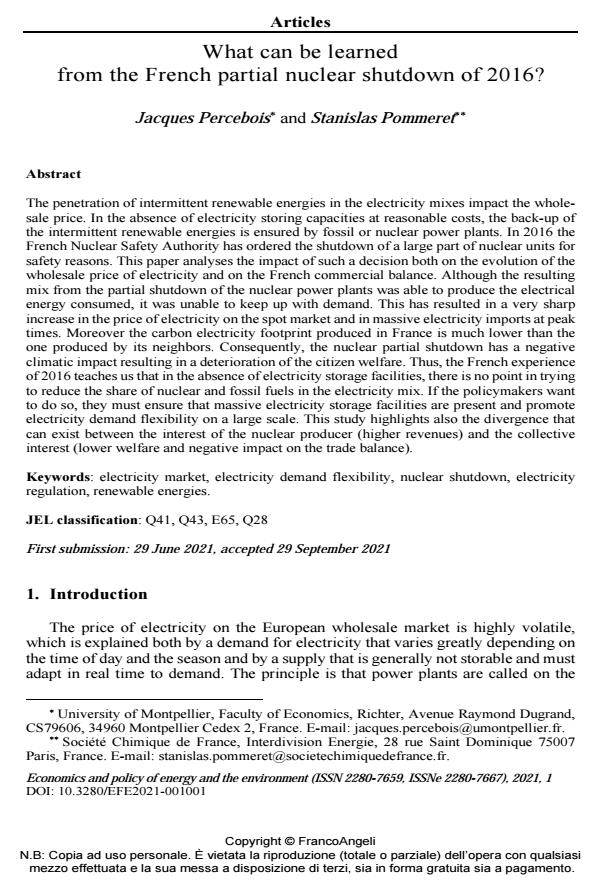What can be learned from the French partial nuclear shutdown of 2016?
Titolo Rivista ECONOMICS AND POLICY OF ENERGY AND THE ENVIRONMENT
Autori/Curatori Jacques Percebois, Stanislas Pommeret
Anno di pubblicazione 2021 Fascicolo 2021/1
Lingua Inglese Numero pagine 15 P. 5-19 Dimensione file 704 KB
DOI 10.3280/EFE2021-001001
Il DOI è il codice a barre della proprietà intellettuale: per saperne di più
clicca qui
Qui sotto puoi vedere in anteprima la prima pagina di questo articolo.
Se questo articolo ti interessa, lo puoi acquistare (e scaricare in formato pdf) seguendo le facili indicazioni per acquistare il download credit. Acquista Download Credits per scaricare questo Articolo in formato PDF

FrancoAngeli è membro della Publishers International Linking Association, Inc (PILA)associazione indipendente e non profit per facilitare (attraverso i servizi tecnologici implementati da CrossRef.org) l’accesso degli studiosi ai contenuti digitali nelle pubblicazioni professionali e scientifiche
The penetration of intermittent renewable energies in the electricity mixes impact the wholesale price. In the absence of electricity storing capacities at reasonable costs, the back-up of the intermittent renewable energies is ensured by fossil or nuclear power plants. In 2016 the French Nuclear Safety Authority has ordered the shutdown of a large part of nuclear units for safety reasons. This paper analyses the impact of such a decision both on the evolution of the whole-sale price of electricity and on the French commercial balance. Although the resulting mix from the partial shutdown of the nuclear power plants was able to produce the electrical energy consumed, it was unable to keep up with demand. This has resulted in a very sharp increase in the price of electricity on the spot market and in massive electricity imports at peak times. Moreover the carbon electricity footprint produced in France is much lower than the one pro-duced by its neighbors. Consequently, the nuclear partial shutdown has a negative climatic impact resulting in a deterioration of the citizen welfare. Thus, the French experience of 2016 teaches us that in the absence of electricity storage facilities, there is no point in trying to re-duce the share of nuclear and fossil fuels in the electricity mix. If the policymakers want to do so, they must ensure that massive electricity storage facilities are present and promote electrici-ty demand flexibility on a large scale. This study highlights also the divergence that can exist between the interest of the nuclear producer (higher revenues) and the collective interest (lower welfare and negative impact on the trade balance).
Parole chiave:electricity market, electricity demand flexibility, nuclear shutdown, electricity regu-lation, renewable energies.
Jel codes:Q41, Q43, E65, Q28
- Reform of the European electricity market: Should we prefer a price based on a weighted average of marginal costs with cross-subsidies? Jacques Percebois, Stanislas Pommeret, in The Electricity Journal 107364/2024 pp.107364
DOI: 10.1016/j.tej.2023.107364 - Les nouveaux défis de la politique énergétique française Jacques Percebois, Stanislas Pommeret, in Reflets de la physique /2024 pp.30
DOI: 10.1051/refdp/202477030 - New challenges for French energy policy Jacques Percebois, Stanislas Pommeret, in Reflets de la physique /2024 pp.30
DOI: 10.1051/refdp/2024s030
Jacques Percebois, Stanislas Pommeret, What can be learned from the French partial nuclear shutdown of 2016? in "ECONOMICS AND POLICY OF ENERGY AND THE ENVIRONMENT" 1/2021, pp 5-19, DOI: 10.3280/EFE2021-001001